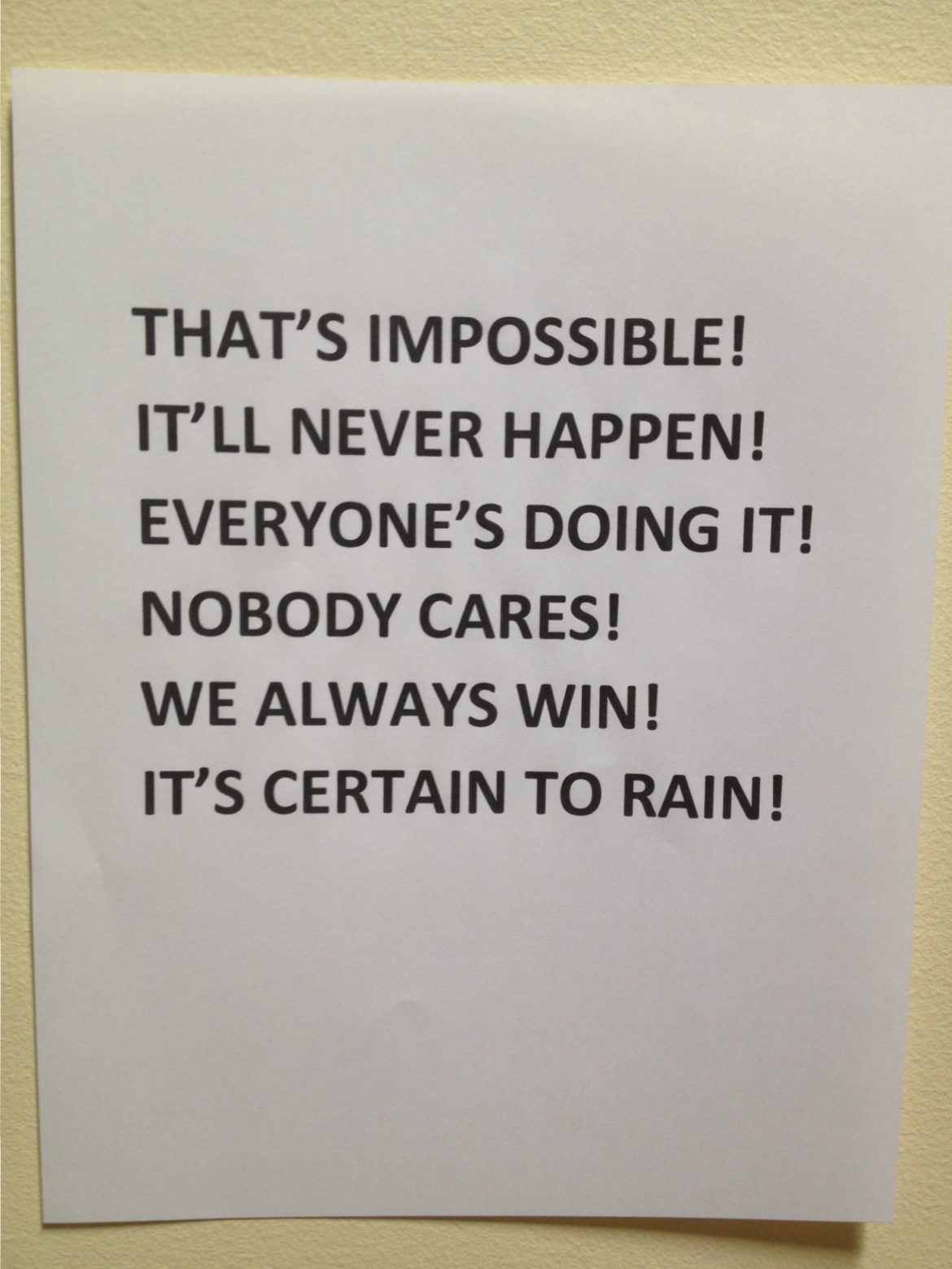
Beware of Absolute Words

Beware of Absolute Words
By: claycormany in Writing
Everybody loves that movie.
He will never finish the race.
They always make that mistake.
It’s impossible for anyone to understand this book.
We hear statements like these nearly every day; we may even make them ourselves. Usually no harm results because we know the speaker is deliberately exaggerating to drive home a point. But when a speaker or writer is not exaggerating, statements with absolute words such as always, never, nobody, and everybody can be dangerous. That’s because they leave no room for flexibility or even a single exception. They create false impressions and unrealistic expectations. (Everyone who goes to college tries marijuana. An SEC school will always win the national football championship.) In a debate, absolute words become woven into shaky arguments that collapse under refutation and damage the credibility of the debater who uses them.
To be sure, there are situations when absolute words can be safely employed. That would include occasions when a speaker or writer reflects on a past event or circumstance.
I never dated until my senior year of high school.
Nobody ran a mile in less than four minutes before 1954.
Everyone in my English class submitted a term paper before the deadline.
Statements like these are safe because they refer to something restricted by time (until my senior year, before 1954) or to a relatively small group (English class). When we move into the present or future, using absolute words becomes riskier because we start making assumptions – often without adequate knowledge — about how we or someone else would behave. The risk increases when we talk about large groups of people, at least some of whom are unknown to us.
I would never use violence against anyone. (But you might to protect a loved one from harm.)
The voters in my district always send a Republican to Congress. (But they might not if that Republican got caught up in a scandal.)
Rather than use absolute words, use words such as probably, usually, seldom, most, and likely. These words have nearly as much impact as absolute words and give you an escape if it turns out you are wrong.
I saw first-hand the danger of absolute words about 12 years ago at a series of State Board of Education meetings I helped administer. Faced with a statewide shortage of school counselors, the Board proposed to eliminate the requirement that applicants have at least two years of teaching experience before being licensed as school counselors. In place of the teaching requirement, new school counselors would complete a one-year mentorship program before taking on the full range of their duties.
A small but vocal group of people opposed the measure. They stressed that having teaching experience was indispensable to the success of a school counselor. They feared that without that experience, a school counselor, however well intentioned, could give students misguided advice. In more than one presentation to the Board, these folks declared, in effect, that nobody could become a successful school counselor through a one-year mentorship program alone. Someone without teaching experience could never succeed as a school counselor.
Unfortunately for these people, the proposal’s supporters did some research on school counselor standards in other states. What did they find? First, that several states had already dropped teaching requirements for their school counselors and second, these never-been-a-teacher counselors were mostly doing an outstanding job. They won accolades not only from educators but from the students and parents they were counseling. In short, the evidence clearly showed that someone without a teaching background could often be an effective school counselor. Needless to say, the Board, by a wide margin, approved replacing the two-year teaching requirement for counselors with the one-year mentorship program.
It’s possible that the State Board would have dropped the teaching requirement for school counselors in any event. However, the opponents of the mentorship program all but guaranteed that outcome by using absolute words to make narrow, inflexible arguments that were easily punctured. As soon as the mentorship opponents said someone without teaching experience could never be a successful counselor, all the supporters had to do was find just one case where such a person had become a successful counselor. That’s all they needed because the word “never” allows for not even a single, rare exception.
So be careful of absolute words. Avoid them in serious debates. They will trap you in arguments you can’t defend and statements you will later regret. They will always – well, often – get you in trouble.
Tags: absolute words, always, everybody, never, nobody
